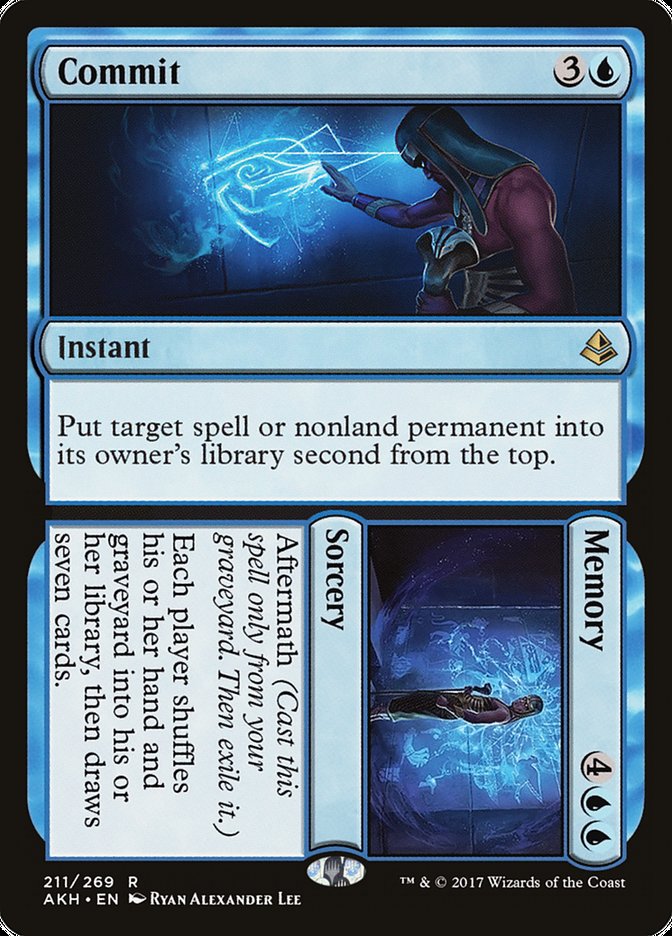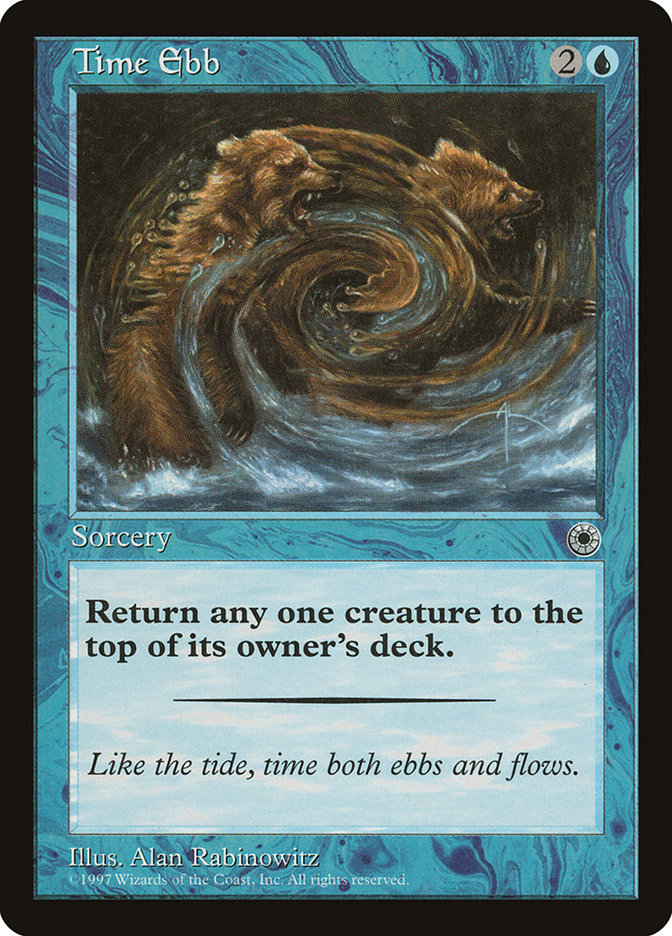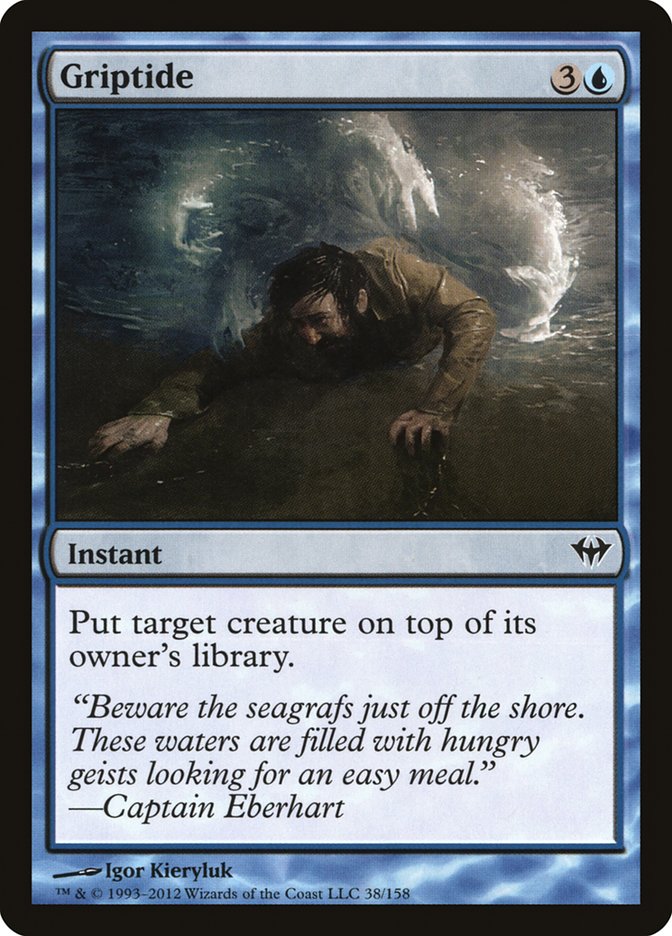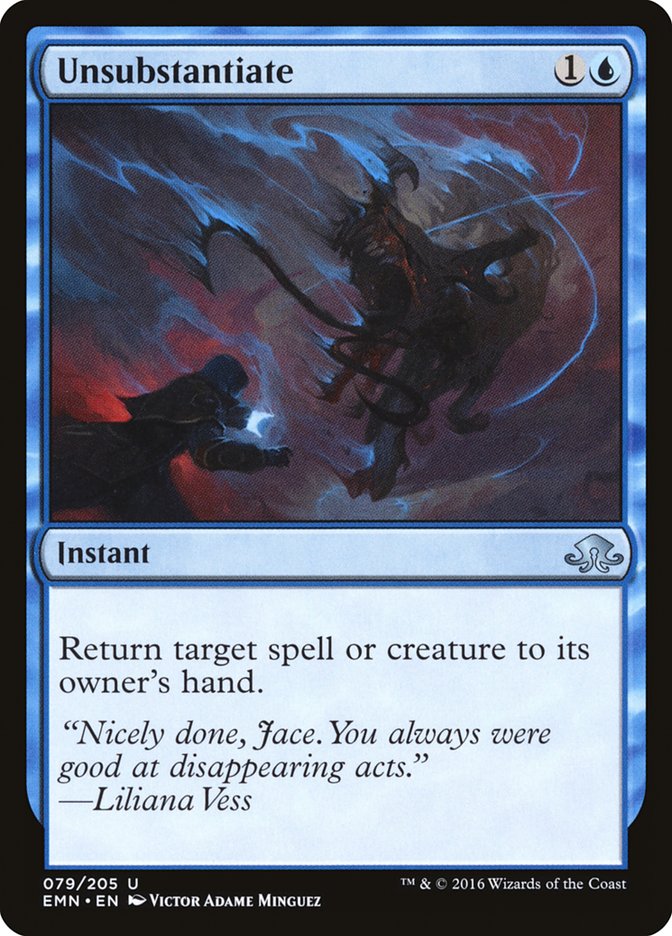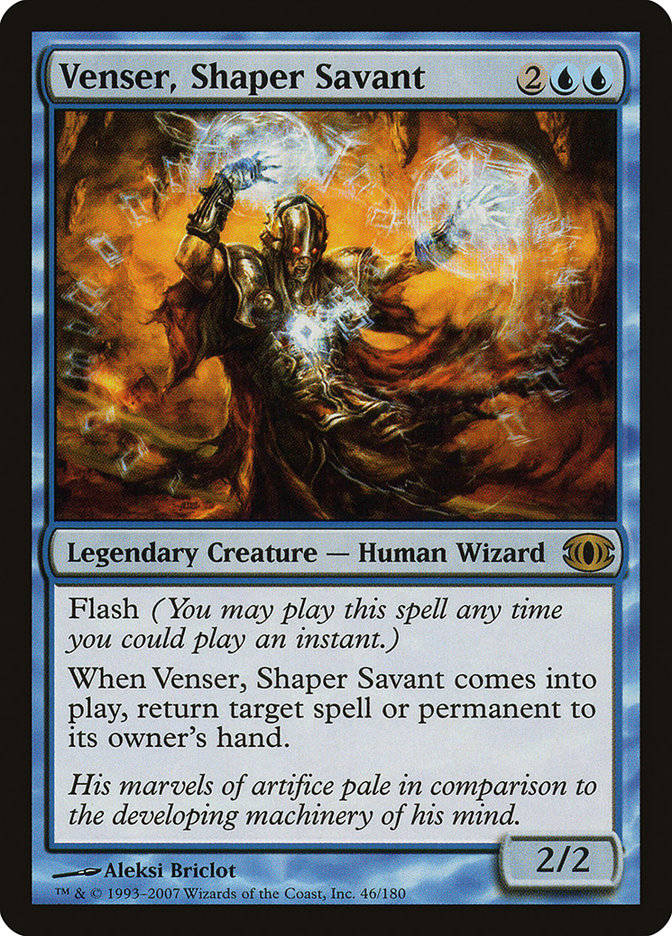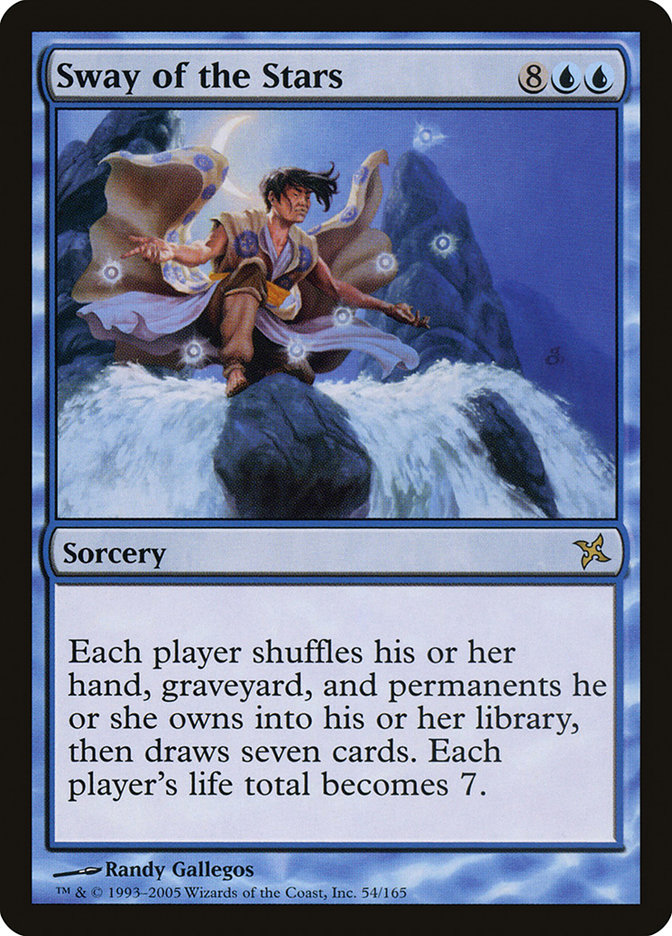Commit // Memory MTG Card
| Card sets | Released in 8 setsSee all |
| Mana cost | |
| Converted mana cost | 10 |
| Rarity | Rare |
| Type | Sorcery |
| Abilities | Aftermath |
Text of card
Aftermath (Cast this spell only from your graveyard. Then exile it.) Each player shuffles his or her hand and graveyard into his or her library, then draws seven cards.
Cards like Commit // Memory
Commit stands out for its unique role in altering the immediate course of a game. Its ability to put target spell or nonland permanent into its owner’s library second from the top is comparable to classic spells like Time Ebb or Griptide which also aim to disrupt an opponent’s game plan by manipulating the deck order. However, Commit’s flexibility to target spells—even on the stack—gives it a powerful edge, allowing you to thwart an opponent’s crucial plays in the heat of the moment.
Another card that echoes Commit’s reactive nature is Unsubstantiate. This spell is less expensive and can return a spell to its owner’s hand instead of the library, providing temporary respite rather than the more delayed interference Commit causes. Then there’s Venser, Shaper Savant—a creature capable of a similar effect. It’s a formidable alternative given its dual role as both creature and spell disruptor. Unlike Commit, Venser affords you a body to utilize in play, though at a higher mana cost.
Commit’s strategic position is cemented when valuing its versatility and delayed disruption capabilities. It excels in strategic decks where board state and combo prevention are pivotal, securing its spot as a noteworthy card in the pantheon of reactive MTG spells.
Cards similar to Commit // Memory by color, type and mana cost
Card Pros
Card Advantage: Commit provides a multifaceted approach to managing card flow, effectively tucking an unwanted spell or nonland permanent into its owner’s library second from the top. This ensures not only that your opponent loses immediate access to that resource but also sets them back by forcing a known draw, keeping you ahead in the card advantage race.
Resource Acceleration: While Commit itself doesn’t provide direct mana acceleration, its latter half, Memory, offers a significant refill opportunity that can reallocate resources. Casting Memory after a Commit can lead to a fresh hand of seven cards, potentially accelerating your resource availability to maintain or regain board control.
Instant Speed: The instant speed nature of Commit gives you the strategic upper hand, allowing flexible responses to your opponent’s actions. Whether they’re casting a critical spell or attacking with a formidable creature, Commit lets you interact on their turn, preserving your threats and planning for a decisive follow-up during your gameplay.
Card Cons
Discard Requirement: Commit requires discarding another card from your hand to utilize its alternative aftermath ability, Memory. This prerequirement can be counterproductive during games where maintaining a full grip of options is crucial.
Specific Mana Cost: The mana cost of Commit is not only specific but also includes a hybrid blue/white mana, which can be restrictive for decks that don’t heavily feature these colors, potentially hampering its inclusion in various strategies.
Comparatively High Mana Cost: Commit, with its four mana cost to basically delay an opponent’s threat or key spell, can represent a significant investment of resources, more so given that competitive formats often offer lower-cost solutions for handling problematic spells and permanents.
Reasons to Include in Your Collection
Versatility: Commit is a powerful multifunctional spell that can serve as a tempo play or disrupt opponents’ key strategies, making it a useful addition to various blue-centric decks.
Combo Potential: As part of a deck’s toolkit, Commit can manipulate the stack to set up game-changing combos or cleverly sidestep your opponents’ countermeasures, enabling more consistent execution of your win conditions.
Meta-Relevance: Given its ability to interact with an array of threats, Commit maintains relevance across different metagames, combatting widely used spells or problematic permanents that dominate competitive play.
How to beat
Commit is a versatile instant card that presents a unique challenge on the battlefield. It temporarily deals with any spell or nonland permanent, not by destroying it, but by tucking it second from the top of its owner’s library. This displacement can derail an opponent’s strategy by delaying a crucial component’s impact on the game. To counter Commit effectively, consider using instant-speed shuffle effects after the card is committed or employing countermeasures for library manipulation. Additionally, having an awareness of when your opponent has enough mana to cast Commit can influence your decision on which spells or permanents to play. Anticipating this play and holding back key cards can mitigate Commit’s strength, as can baiting out the spell with less important cards. Furthermore, instant-speed draw spells can aid in swiftly recovering the committed card, allowing for seamless adaptation to this setback. Overall, overcoming Commit requires strategic planning and timing, ensuring you keep the upper hand against this potent control tool.
Where to buy
If you're looking to purchase Commit // Memory MTG card by a specific set like Amonkhet and Amonkhet Promos, there are several reliable options to consider. One of the primary sources is your local game store, where you can often find booster packs, individual cards, and preconstructed decks from current and some past sets. They often offer the added benefit of a community where you can trade with other players.
For a broader inventory, particularly of older sets, online marketplaces like TCGPlayer, Card Kingdom and Card Market offer extensive selections and allow you to search for cards from specific sets. Larger e-commerce platforms like eBay and Amazon also have listings from various sellers, which can be a good place to look for sealed product and rare finds.
Additionally, Magic’s official site often has a store locator and retailer lists for finding Wizards of the Coast licensed products. Remember to check for authenticity and the condition of the cards when purchasing, especially from individual sellers on larger marketplaces.
Below is a list of some store websites where you can buy the Commit // Memory and other MTG cards:
 BUY NOW
BUY NOW BurnMana is an official partner of TCGPlayer
- eBay
- Card Kingdom
- Card Market
- Star City Games
- CoolStuffInc
- MTG Mint Card
- Hareruya
- Troll and Toad
- ABU Games
- Card Hoarder Magic Online
- MTGO Traders Magic Online
See MTG Products
Printings
The Commit // Memory Magic the Gathering card was released in 7 different sets between 2017-04-28 and 2023-11-17. Illustrated by Ryan Alexander Lee.
| # | Released | Name | Code | Symbol | Number | Frame | Layout | Border | Artist |
|---|---|---|---|---|---|---|---|---|---|
| 1 | 2017-04-28 | Amonkhet | AKH | 211 | 2015 | Aftermath | Black | Ryan Alexander Lee | |
| 2 | 2017-04-29 | Amonkhet Promos | PAKH | 211p | 2015 | Aftermath | Black | Ryan Alexander Lee | |
| 3 | 2017-04-29 | Amonkhet Promos | PAKH | 211s | 2015 | Aftermath | Black | Ryan Alexander Lee | |
| 4 | 2019-11-07 | Mystery Booster | MB1 | 1537 | 2015 | Aftermath | Black | Ryan Alexander Lee | |
| 5 | 2020-08-13 | Amonkhet Remastered | AKR | 54 | 2015 | Aftermath | Black | Ryan Alexander Lee | |
| 6 | The List | PLST | AKH-211 | 2015 | Aftermath | Black | Ryan Alexander Lee | ||
| 7 | 2022-04-29 | New Capenna Commander | NCC | 216 | 2015 | Aftermath | Black | Ryan Alexander Lee | |
| 8 | 2023-11-17 | The Lost Caverns of Ixalan Commander | LCC | 147 | 2015 | Aftermath | Black | Ryan Alexander Lee |
Legalities
Magic the Gathering formats where Commit // Memory has restrictions
| Format | Legality |
|---|---|
| Historicbrawl | Legal |
| Historic | Legal |
| Legacy | Legal |
| Oathbreaker | Legal |
| Gladiator | Legal |
| Pioneer | Legal |
| Commander | Legal |
| Modern | Legal |
| Vintage | Legal |
| Duel | Legal |
| Explorer | Legal |
| Penny | Legal |
| Timeless | Legal |
Rules and information
The reference guide for Magic: The Gathering Commit // Memory card rulings provides official rulings, any errata issued, as well as a record of all the functional modifications that have occurred.
| Date | Text |
|---|---|
| 2017-04-18 | A spell with aftermath cast from a graveyard will always be exiled afterward, whether it resolves, it's countered, or it leaves the stack in some other way. |
| 2017-04-18 | All split cards have two card faces on a single card, and you put a split card onto the stack with only the half you're casting. The characteristics of the half of the card you didn't cast are ignored while the spell is on the stack. For example, if an effect prevents you from casting green spells, you can cast Destined of Destined // Lead, but not Lead. |
| 2017-04-18 | Each split card has two names. If an effect instructs you to choose a card name, you may choose one, but not both. |
| 2017-04-18 | Each split card is a single card. For example, if you discard one, you've discarded one card, not two. If an effect counts the number of instant and sorcery cards in your graveyard, Destined // Lead counts once, not twice. |
| 2017-04-18 | If a copy of a spell or a token is put into its owner's library, it's moved there, then it will cease to exist as a state-based action. |
| 2017-04-18 | If a spell is put into its owner's library, it's removed from the stack and thus will not resolve. The spell isn't countered; it just no longer exists. This works against a spell that can't be countered. |
| 2017-04-18 | If another effect allows you to cast a split card with aftermath from a graveyard, you may cast either half. If you cast the half that has aftermath, you'll exile the card if it would leave the stack. |
| 2017-04-18 | If another effect allows you to cast a split card with aftermath from any zone other than a graveyard, you can't cast the half with aftermath. |
| 2017-04-18 | If the target's owner's library contains no cards, the target spell or permanent will be put into that player's library as the only card. |
| 2017-04-18 | If you cast the first half of a split card with aftermath during your turn, you'll have priority immediately after it resolves. You can cast the half with aftermath from your graveyard before any player can take any other action if it's legal for you to do so. |
| 2017-04-18 | Split cards with aftermath have a new frame treatment—the half you can cast from your hand is oriented the same as other cards you'd cast from your hand, while the half you can cast from your graveyard is a traditional split card half. This frame treatment is for your convenience and has no rules significance. |
| 2017-04-18 | While not on the stack, the characteristics of a split card are the combination of its two halves. For example, Destined // Lead is a green and black card, it is both an instant card and a sorcery card, and its mana value is 6. This means that if an effect allows you to cast a card with mana value 2 from your hand, you can't cast Destined. This is a change from the previous rules for split cards. |
| 2017-07-14 | Once you've started to cast a spell with aftermath from your graveyard, the card is immediately moved to the stack. Opponents can't try to stop the ability by exiling the card with an effect such as that of Crook of Condemnation. |
